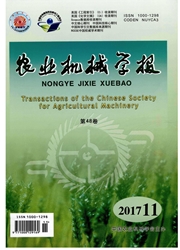

 中文摘要:
中文摘要:
针对现行电动汽车再生制动的不足,提出一种新型电磁机械耦合再生制动系统(EMCB),进行了动力学分析和耦合机理研究;针对目前传统ABS离散开关控制的不足,基于EMCB系统和模糊自适应滑模控制提出了一种连续状态控制的ABS控制策略,以对接路面下的车辆直行制动工况和低附路面下的弯道制动工况为例,对车轮滑移率、制动能回收率、制动稳定性等进行了仿真分析。研究结果表明,所提出的ABS控制策略具有良好的响应性、鲁棒性和滑移率控制性能,既保证了制动稳定性和制动效能,又提高了制动能回收率,有效增加了电动汽车的续驶里程。
 英文摘要:
英文摘要:
For the deficiency of current electric vehicle compound regenerative braking,a new design of electromagnetic-mechanical coupled regenerative braking system was proposed( referred to as EMCB),and the coupled mechanism and dynamic model were analyzed. For the deficiency of conventional ABS discrete on-off control,a continuous-state control of anti-lock braking control strategy was proposed based on EMCB system and fuzzy-adaptive sliding mode control for electric vehicle. With Matlab / Simulink the dynamic model of EMCB and controller model were established,and the vehicle model was built by Car Sim. With the co-simulation platform of Matlab / Simulink and Car Sim,the braking energy recovery,braking stability and braking efficiency were studied and simulated in case of straight braking condition on step adhesive coefficient road and cornering braking condition on low adhesive coefficient road. The results showed that the ABS control strategy had good responsiveness, robustness and slip control performance. Fuzzy-adaptive variable structure control was insensitive to the road conditions and system model and control variable was flat and smooth,it reduced the demand of executive system. The control strategy ensured braking stability and braking efficiency at the limit of adhesion and large angle steering,which can maintain high recovery efficiency and increase the driving range of electric vehicles effectively.
 同期刊论文项目
同期刊论文项目
 同项目期刊论文
同项目期刊论文
 EBD Control Research on Nonuniformity Roads for Electric Vehicles on Energy Regenerative and Feedbac
EBD Control Research on Nonuniformity Roads for Electric Vehicles on Energy Regenerative and Feedbac 期刊信息
期刊信息
